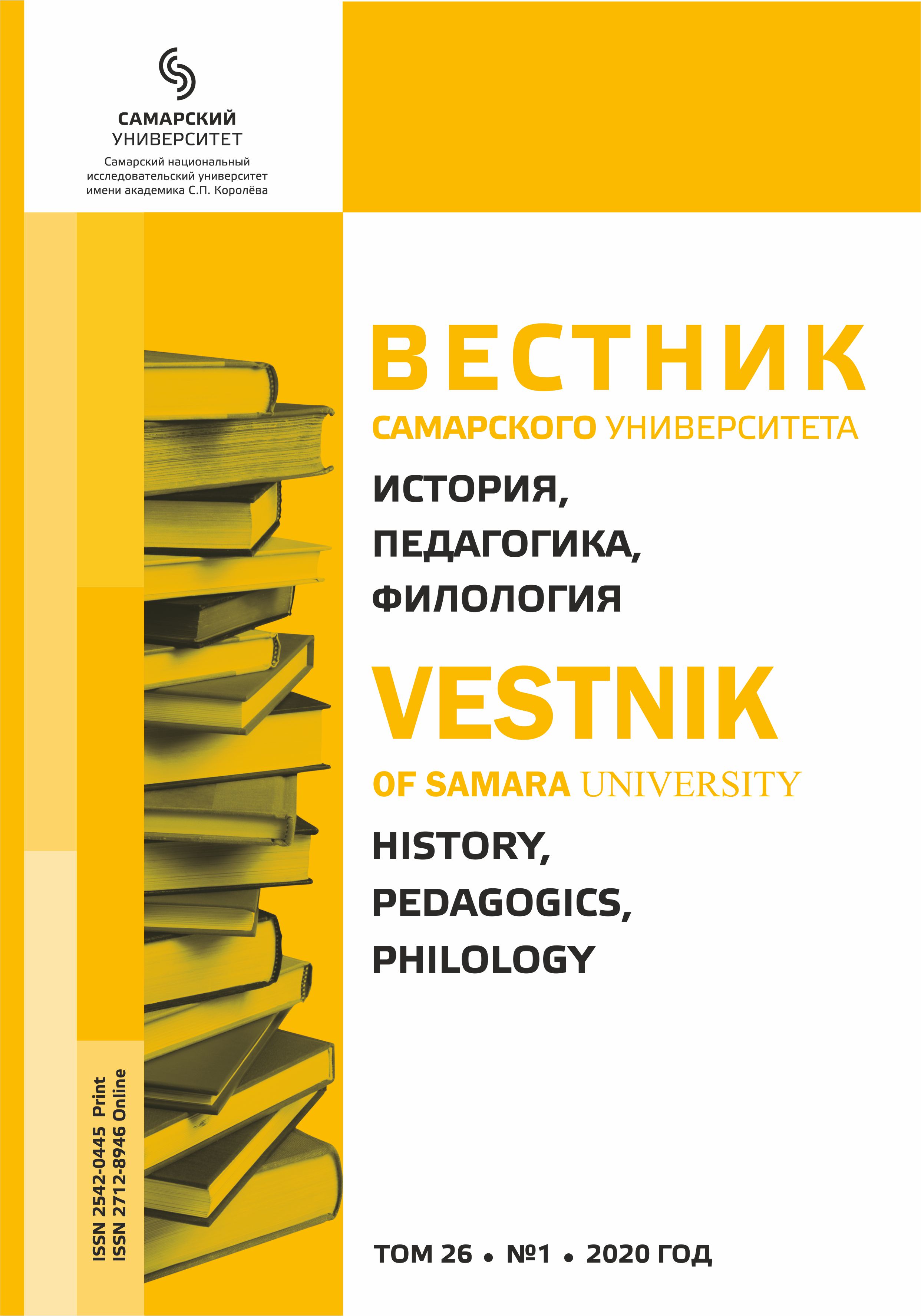Etiquette traditions of the webinars for teachers / learners of English
- Authors: Tanchuk A.S.1
-
Affiliations:
- Samara National Research University
- Issue: Vol 26, No 1 (2020)
- Pages: 112-118
- Section: Articles
- URL: https://journals.ssau.ru/hpp/article/view/7737
- DOI: https://doi.org/10.18287/2542-0445-2020-26-1-112-118
- ID: 7737
Cite item
Full Text
Abstract
The verbal and nonverbal markers of etiquette traditions in the webinars for modern English language learners are described and systematized with regard to their linguocultural aspects. One of the stimuli for this research is the growing interest in learning the English language through Internet technologies, especially through webinars, which are currently one of the most popular ways of learning by the Internet strategies. Another impetus for this study is the importance of using the correct speech behavior formulae within the English-speaking communicative environment. These speech formulae are a must for the effective communication of both native members of the English culture and representatives of other cultures. The present research project is aimed at systematizing verbal and non-verbal trends in the sphere of communication based on the webinars scripts intended for learners of English. The research materials embrace the webinars presented by famous British scholars in teaching foreign languages. These scripts are taken from the websites and portals such as British Council, Cambridge English, Macmillan education, Education First, etc. that are extremely popular among methods providing teachers of English from all over the world. The data obtained and studied in terms of discourse analysis are evidently showing that the key trend in learning English today focuses on the methods providing the formation of effective conversational skills through various authentic communicative situations. These webinars are traditionally focusing upon conversational techniques, speaking/spoken English vocabulary, fluency of speaking etc. The webinars’ scripts are considered in terms of basic characteristics describing the moderator’s way of communication with the audience. The article is aimed at studying modern trends in the English educational discourse through webinar etiquette traditions which demand a thorough knowledge of cultural background and a good command of conversational English.
About the authors
A. S. Tanchuk
Samara National Research University
Author for correspondence.
Email: morenov@ssau.ru
ORCID iD: 0000-0003-4073-8221
postgraduate student of the Department of English Language, Faculty of Philology and Journalism
References
- Ahrens, Zaščerinska, Ramar, Andreeva 2016 – Ahrens A., Zaščerinska J., Ramar H. and Andreeva N. (2016) Educators Opinion on Webinars in Higher Education. Society, integration, education. Proceedings of the International Scientific Conference. Volume I, May 27th–28th, pp. 15–27. DOI: http://dx.doi.org/10.17770/sie2016vol1.1488.
- Crystal 2017 – Crystal D. (2017) My priority for the next 50 years: an online cultural dictionary. TCL – Training Language and Culture, vol. 1, issue 1, pp. 14–27. DOI: http://doi.org/10.29366/2017tlc.1.1.1.
- Herring 2007 – Herring S.C. (2007) A Faceted Classification Scheme for Computer-Mediated Discourse. Language@Internet, no. 4, Article 1, pp. 1–37. Available at: http://www.languageatinternet.org/articles/2007/761.
- Kharkovskaya, Ponomarenko, Rudyuk 2017 – Kharkovskaya A.A., Ponomarenko E.V. and Rudyuk A.V. (2017) Minitexts in modern educational discourse: functions and trends. TCL – Training Language and Culture, vol. 1, issue 1, pp. 62–76. DOI: http://doi.org/10.29366/2017tlc.1.1.4.
- Dazuk 2006 – Dazuk S.A. (2006) Communication strategies. Electronic publication: Center of Humanitarian Technologies. (In Russ.) Available at: http://gtmarket.ru/laboratory/expertize/2006/2751.
- Ivanova 2009 – Ivanova S.V. (2009) Topical Issues of Linguocultural Studies. In: Language system: synchrony and diachrony: Interacademic collection of scientific articles. Ufa: RITs BashGU, pp. 267–273. Available at: http://www.elibrary.ru/item.asp?id=23200729. (In Russ.)
- Ivanova, Chanysheva 2010 – Ivanova S.V. and Chanysheva Z.Z. (2010) Cultural linguistics: problems, researches, solutions: monograph]. Ufa: RITs BashGU, 366 p. (In Russ.).
- Kalinina 2015 – Kalinina S.D. (2015) Webinar as a Form of E-learning in Higher Education. MGIMO Review of International Relations, no. 2 (41), pp. 291–295. (In Russ.) Available at: http://www.elibrary.ru/item.asp?id=23564642.
- Karasik 1992 – Karasik I.V. (1992) The language of social status. Moscow: Institut yazykoznaniya AN SSSR, VGPU, 330 p. (In Russ.) Available at: http://www.l-406.narod.ru/SocL/karasik.pdf.
- Karasik 2002 – Karasik I.V. (2002) Language circle: personality, concepts, discourse. Volgograd: Peremena, 477 p. (In Russ.) Available at: http://docplayer.ru/28188986-Yazykovoy-krug-lichnost-koncepty-diskurs.html.
- Klyuev 2002 – Klyuev E.V. (2002) Speech communication. Moscow: Ripol Klassik, 320 p. (In Russ.). Available at: http://padaread.com/?book=39837&pg=1.
- Leontovich 2003 – Leontovich O.A. (2003) Russia and the USA: introduction into intercultural communication. Volgograd: Peremena, 299 p. (In Russ.).
- Litvinova 2017 – Litvinova V.A. (2017) Lingvocultural specificity of the speech act «etiquette apology» in the British communicative tradition. Science Journal of VolSU. Linguistics, vol. 16, no. 2, pp. 160–167. DOI: http://doi.org/10.15688/jvolsu2.2017.2.17.
- Tlenkopacheva 2016 – Tlenkopacheva M.N. (2016) The webinar as a constituent of the modern pedagogical discourse. Cognitive studies of language, no. 25, pp. 1043–1049 (In Russ.) DOI: http://doi.org/10.20916/2071-9639-2016-25-1043-1049.
- Tlenkopacheva 2018 – Tlenkopacheva M.N. (2018) Genre features of English-language training webinars. Philological Sciences. Issues of Theory and Practice, no. 1 (79), part 1, pp. 176–180 (In Russ.) Available at: http://www.elibrary.ru/item.asp?id=32403747.
- Kharkovskaya 2012 – Kharkovskaya A.A. (2012) Virtual «business cards» of modern American and British schools: discursive analysis experience. In: Topical issues of English linguistics: a collection of scientific articles dedicated to the anniversary of the head of the Department of English Linguistics, Faculty of Philology, Lomonosov Moscow State University, Doctor of Philological Sciences, professor O.V. Alexandrova. Moscow, pp. 383–391 (In Russ.) Available at: http://www.elibrary.ru/item.asp?id=25720101.
- Chernogrudova 2008 – Chernogrudova E.P. (2008) Basics of speech communication: textbook. Moscow: Ekzamen, 126 p. (In Russ.)
- Shchipitsina 2019 – Shchipitsina L.Yu. (2019) Web Lecture as an Oral Internet Genre. Speech Genres, no. 3 (23), pp. 215–226. (In Russ.) DOI: http://doi.org/10.18500/2311-0740-2019-3-23-215-226.
Supplementary files













